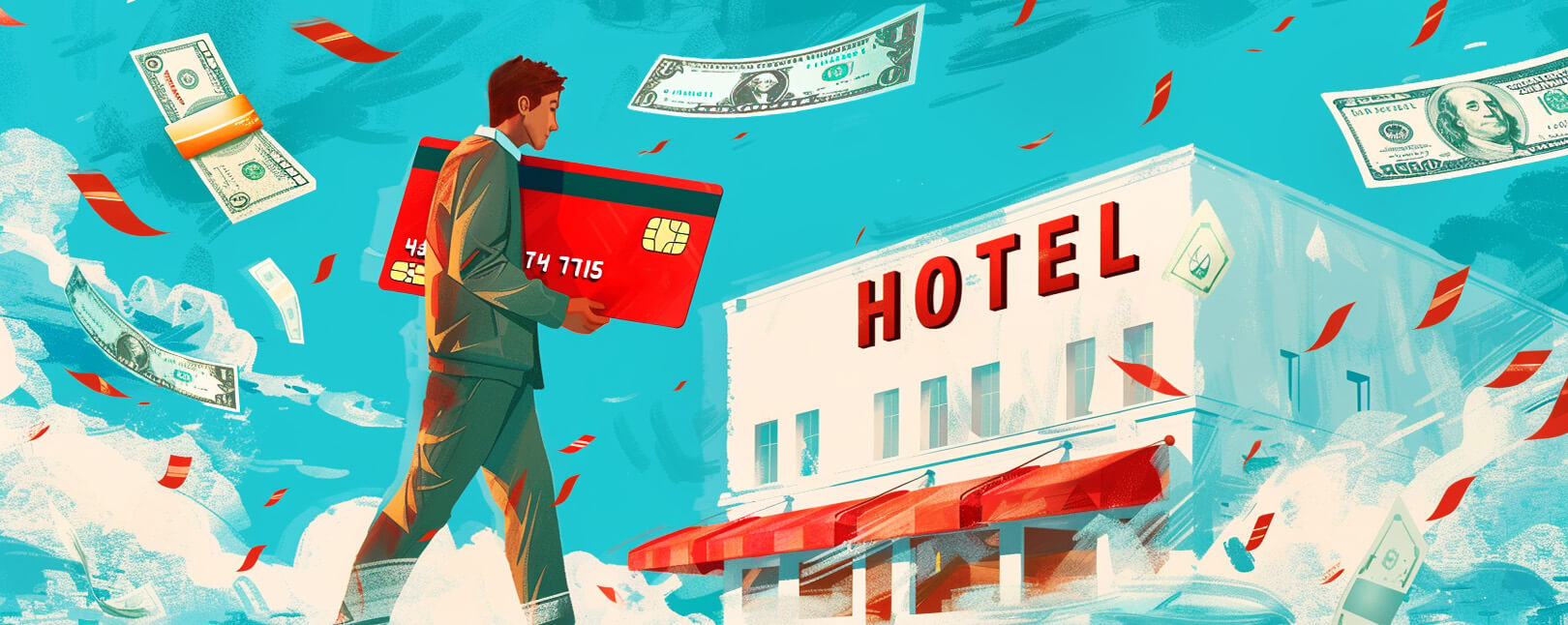What Consumers & Merchants Need to Know About Hotel Chargebacks
There are some verticals that are more susceptible to chargebacks than others. High-dollar items like camera equipment, computers, and designer fashion are at risk. That said, dispute-to-transaction ratios in the hospitality space tend to be among the highest in all verticals.
The epidemic of hotel booking chargebacks isn’t slowing down, either. In fact, it's gaining even more steam over time. In this piece, we’re going over chargebacks in the hotel industry, providing advice to help both cardholders and merchants.
Recommended reading
- What is the Amex Fraud Full Recourse Program?
- How to Find the Right Chargeback Management System
- Do Chargeback Bans Actually Help Stop Disputes?
- What is a Business Continuity Plan? Tips, Guides & Examples
- What is 3D Secure 2.0? How it Works & Why It’s Necessary
- Visa Account Updater: What it Does & How it Works
Chargebacks in the Hotel Industry: At a Glance
With chargebacks in the hospitality space, the cardholder makes a booking, either through the merchant or a third-party like Expedia or Booking.com. The cardholder later contacts their bank, claiming that the booking was not satisfactory, and requesting a return of funds.
The hotel industry's chargeback challenges are unique due to the service-based nature of its business, where the product is the experience itself. In retail, a chargeback might be resolved by returning a physical item. In lodging and hospitality, though, services rendered cannot be returned. This inherent difference complicates the resolution process, as hotels must provide compelling evidence that the service was delivered as agreed upon to fight the chargeback successfully.
Furthermore, hotels must deal with the high costs of vacancy when a room is booked and unused due to a last-minute cancellation or no-show, which can also lead to disputes. The combination of high-value transactions, advance bookings, and the subjective quality of service makes hotel chargebacks particularly challenging to manage.
Common Causes of Hotel Chargebacks
Cardholders file chargebacks in the hotel industry for several reasons, each stemming from different experiences and expectations. Here are some of the most common claims that lead to disputes:
There are valid reasons to file a hotel booking chargeback. This does not imply that cardholders should file a chargeback as a first recourse, though. Customers should always try to resolve the issue with the hotelier before calling the bank to dispute a charge. They should also be aware that the bank may request evidence to substantiate any claims made.
When cardholders file chargebacks without a valid reason to do so, they’re engaging in a practice known as friendly fraud. If a cardholder believes they have a valid claim, they should always try to contact the merchant first. Resolving the issue with the hotelier will likely get the money back faster and with little incident, whereas filing a dispute with the bank could take weeks, or even months to finally resolve.
Breaking Down Criminal Fraud in Hotels & Hospitality
Fraud tends to impact the travel and leisure industries even more heavily than other sectors like retail or digital goods. We can attribute this to five specific factors:
The American Hotel and Lodging Association asserts that as much as 55% of all card fraud in the US takes place within the hospitality industry. Of course, that only takes criminal fraud into consideration. When you factor in other loss sources like friendly fraud, the real figure is much higher.
So, why is hospitality a target for fraudsters? Well, hotel stays are often a very personal experience. As such, they can constitute an uncomfortable gray area.
From the bank’s perspective, it can be difficult to ask a customer to relay the personal details of a recent visit or ask what made that visit uncomfortable. By the same token, a hotelier might mistake a polite response for approval of an unsatisfactory service. You can see how a fraudster might view this as an opportunity to capitalize on miscommunication.
How to Dispute a Hotel Charge
When disputing a hotel charge, cardholders should follow a structured process to ensure their concerns are addressed appropriately and efficiently. Here’s some practical advice on how to handle this situation:
Step #1 | Review Your Bill Carefully
Before filing a dispute, thoroughly review your bill and reservation details to confirm the accuracy of the charges. Ensure you understand each item listed and cross-check it with your receipts and booking confirmation.
Step #2 | Gather Documentation
Compile all relevant documentation, including detailed notes of your stay, communication with the hotel, receipts, and booking confirmations. This evidence will be crucial whether you resolve the dispute with the hotel directly or escalate to your card issuer.
Step #3 | Contact the Hotel Directly
Often, issues can be resolved quickly by directly contacting the hotel. Explain the problem clearly and provide any supporting documents such as receipts, reservation confirmations, or photographs that justify your dispute. Hotels often prefer to resolve these issues amicably to maintain customer satisfaction and avoid chargebacks.
Step #4 | Call the Bank
If the merchant does not resolve the issue to your satisfaction, you can formally dispute the charge with your credit card issuer. This typically involves filling out a dispute form and providing your collected evidence. Be clear and concise in explaining why you believe the charge is incorrect or invalid.
Step #5 | Follow Up Regularly
Keep track of your dispute’s progress by regularly communicating with your credit card issuer. Ask for updates and provide any additional information they may require to process your dispute.
Step #6 | Know Your Rights
Familiarize yourself with your credit card’s policies on disputes and chargebacks and any consumer protection laws in your jurisdiction that may apply to your situation. This knowledge can empower you to make informed decisions and understand the timelines and outcomes possible.
What Are Hotels Doing to Fight Chargebacks?
New technologies may help hotel operators cut down on chargeback issuances. Take digital check-in and keyless entry systems, for example, that match the cardholder to their mobile device may help verify users’ identities. They offer better insight into a guest’s specific activities on the property than paper records held by hotel staff.
These systems may not capture every detail of a guest's stay, but they can confirm that the guest was present at the hotel and used their room. This confirmation is critical during disputes where a guest claims they never visited the property. In the event of a chargeback, these systems can provide a comprehensive audit trail and immediately communicate this information to the vendor handling the dispute. The automated system quickly informs both vendors and clients, allowing for proactive management of the situation, which is more efficient than waiting for multiple parties to respond.
Moreover, this approach keeps the hotel updated with regular reports and records, which are valuable for future reference. This automation strategy can help resolve disputes effectively and boost labor productivity. It shifts the burden of managing chargebacks away from accounting and finance teams. This strategy can be particularly advantageous if it helps preserve even a few bookings each month.
What Else Can Hotel Operators Do To Prevent Chargebacks?
You can reduce your chargeback ratio and prevent hotel chargebacks with a few simple steps. We’ve identified some basic steps you can take today that will help you avoid disputes and retain more revenue:
Have Additional Questions About Stopping Hotel Chargebacks?
You shouldn’t be worrying about fighting hotel chargebacks or keeping up with industry regulations. You should be focused on running your business.
Chargebacks911® offers the industry’s most innovative solutions for chargebacks. Our technologies enable merchants to identify the source of disputes and then deploy the right solution to deliver immediate results.
Friendly fraud in the hospitality industry isn’t slowing down. That’s why you need to kick chargeback mitigation into high gear. Contact us today to learn more.
FAQs
How do you win a hotel dispute?
To win a hotel dispute, you need to gather and present clear, comprehensive documentation that substantiates your case, including communication records, receipts, and policies. Respond promptly and effectively to the dispute through your payment processor, adhering strictly to their guidelines and timelines.
Can a hotel reverse a payment?
Yes, a hotel can reverse a payment, typically by issuing a refund directly to the guest's payment card. This process is managed through the hotel's payment processing system and is often used to resolve billing errors or guest disputes amicably.
What solutions would you suggest for reducing chargebacks within a hotel?
Hotels should communicate policies and charges clearly, ensure accurate billing, and provide exceptional customer service to address issues proactively. Additionally, using secure payment processing technologies and maintaining thorough records of transactions and guest interactions can significantly reduce the incidence of chargebacks.
Can you demand a refund from a hotel?
Yes, you can demand a refund from a hotel if the services provided did not meet the advertised standards or if there were billing errors. It's best to initially request the refund directly from the hotel, providing any relevant evidence to support your claim.














